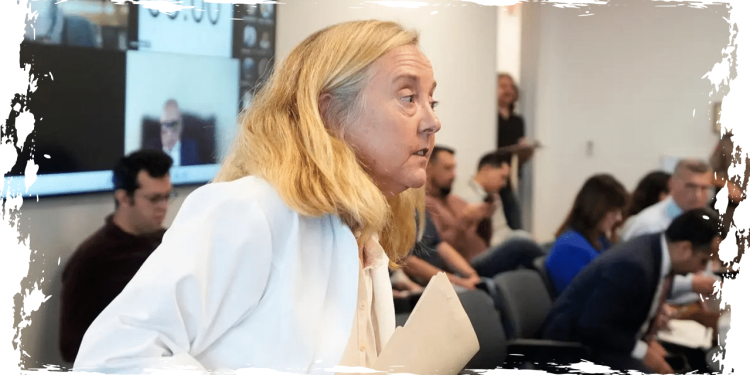One of the leading anti-abortion activists in the United States has recently been appointed to a Texas health committee responsible for reviewing cases of maternal deaths.
Reproductive justice advocates are expressing concern over the appointment, as they believe that the state’s strict abortion ban has already endangered the lives of pregnant women. They fear that this appointment could potentially hinder the committee’s ability to thoroughly assess the law’s impact on maternal deaths during and immediately after pregnancy.
Kamyon Conner, executive director of the Texas Equal Access Fund, an abortion assistance group that advocates for reproductive health equity, expressed her thoughts on the appointment, emphasizing the significance it holds in addressing the pressing issue of maternal mortality. She believes that this appointment reflects the state’s prioritization of their anti-abortion agenda rather than safeguarding the lives of pregnant individuals in Texas.
Dr. Ingrid Skop, an OB-GYN based in San Antonio, has always been outspoken about her stance on abortion.
Skop, who holds positions as the vice-president and director of medical affairs for the national anti-abortion research organization Charlotte Lozier Institute and as a member of the American Association of Pro-Life Obstetricians and Gynecologists, is actively involved in a lawsuit before the US Supreme Court. The lawsuit aims to revoke the Food and Drug Administration’s approval of the abortion drug mifepristone, which Skop argues is “dangerous” despite the overwhelming evidence over the years confirming its safety. It is worth noting that several research papers authored by Skop had to be retracted due to misleading errors.
According to Skop, the overturning of Roe v Wade by the supreme court is seen as a victory in the battle, but not the end of the war. Despite this, Skop has expressed support for a controversial stance, advocating for the mandatory carrying of pregnancies to term for rape and incest victims as young as nine or 10. Skop argued that if a young girl has reached sexual maturity and is capable of menstruating and becoming pregnant, she can safely give birth to a baby. However, it is important to note that pregnancy at such a young age poses significant health risks, including the potential for pre-eclampsia and infections.
Skop has been a frequent witness in Texas, providing testimony at the legislature and in court to support state abortion bans. Most recently, she testified in a hearing opposing abortion care for Kate Cox, a Dallas woman who sought emergency access to the procedure after receiving a lethal fetal diagnosis.
In Texas, numerous cases have emerged where pregnant women are being refused emergency abortions, even when they have life-threatening pregnancy complications. Research has revealed that certain patients are being compelled to wait until they are on the brink of death before doctors, who may face criminal charges under the state’s ban, step in. However, Skop contends that the issue lies with the discretion of individual physicians rather than the law itself.
Skop disagrees with the arguments put forth by many experts that abortion bans would result in a higher number of maternal deaths. In fact, she suggests that such bans might even contribute to reducing maternal mortality rates. According to Skop, the notion of a connection between abortion restrictions and risks to maternal mortality is flawed.
Maternal deaths in Texas, which have been among the highest in the country, experienced a staggering increase of more than 100% between 1999 and 2019. Skop emphasized the urgent need for a thorough discussion on the state’s alarmingly high maternal mortality rate in an interview with the Houston Chronicle.
According to Skop, there are various factors contributing to these statistics, such as chronic illnesses, poverty, and challenges in accessing prenatal care. She has always been driven to find ways to enhance women’s healthcare. Skop has been an advocate for pregnant women and their unborn children for over three decades, aligning with the majority of OB-GYNs who do not perform elective abortions.
The appointment of Skop has been questioned by The American College of Obstetricians and Gynecologists. They emphasize the importance of the maternal review committee members being guided by data rather than ideology. It is crucial for them to have an unbiased perspective, especially considering the inherent connection between abortion and maternal health.
The American College of Obstetricians and Gynecologists (ACOG) emphasized the importance of impartiality, lack of conflicts of interest, and adherence to proper standards of care when assessing maternal mortality and morbidity in Texas. ACOG expressed concern over the already alarming levels of maternal health issues in the state, which existed prior to the implementation of abortion bans and restrictions.
According to ACOG, the bias against abortion has resulted in compromised analysis and faulty data. They pointed out that Dr. Skop co-authored three research papers critical of abortion, which were later retracted by the academic publisher due to unjustified or incorrect factual assumptions, errors, and misleading data presentations. The publisher concluded that these flaws demonstrated a lack of scientific rigor and invalidated the authors’ conclusions.
In 2023, when legislation was passed to eliminate her position as a “community advocate,” Wilson had to apply for a different role on the committee. Unfortunately, she was not selected for the job.
Skop, despite having a background in working in a bustling city like San Antonio, has been chosen for a role that is intended for someone from a rural community. She is one of the seven newly appointed individuals who will commence their six-year term on June 1st.
“I believe I am well-suited to represent my community as a black mother who has personally experienced a traumatic pregnancy,” expressed Wilson. She further questions, “Whose community is [Skop] really representing?”










